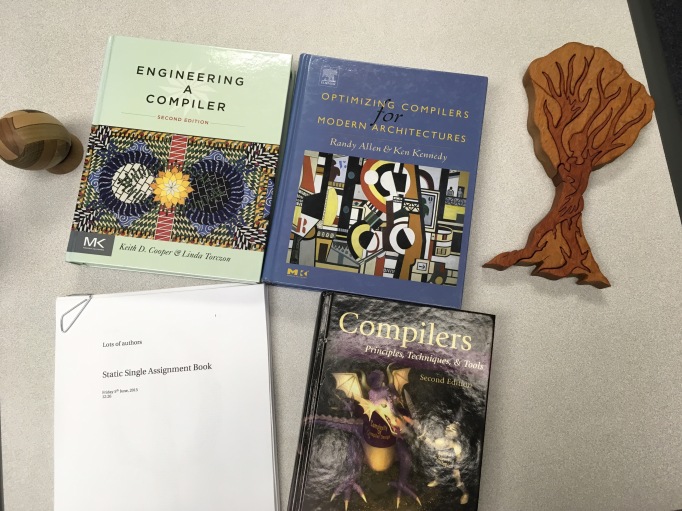Hi CS255/455 students:
Hope you all enjoyed the course! The first assignment is to implement local value numbering (LVN) and check for redundant expressions.
You are expected to handle commutativity for commutative operations. Recall that an operation is commutative if you can change the order of operands without changing the result. For example (+) is commutative but (-) is not. Your implementation must be able to assign the same value number to a+b and b+a.
As the second requirement, improve LVN by adding the Stewart extension. The Stewart extension improves LVN by identifying additional redundancy in the following example form.
a = b + c
d = a – b
Specifically, it guides LVN to assign the same value number to both (c) and (d). The idea of the solution was first raised by Chris Stewart when he was taking the class around 2004. His idea was to insert additional value relations into the value number table. You should first work out this idea and make it concrete as an extension to the basic value numbering algorithm.
Note 1: You are expected to apply the Stewart extension on four operations: ‘+’, ‘-‘, ‘*’, and ‘/’.
Note 2: You should make sure that the Stewart extension can be applied on the following code as well.
a = b + c
e = a
d = e – b
Finally, transform the code sequence by removing the redundant expression(s) and print the transformed code sequence.
To complete this assignment, take the following steps:
1. From Blackboard, download the code from Course Materials: 02 Local value numbering demo programs
2. Implement and add commutativity and Stewart extension to the LVN class in the file vn.rb.
3. Implement code generation.
4. Make sure all the tests in vn_tests.rb pass.
5. Document any test failures, if there is any, and explain why, in README.txt in plain text.
6. Extra credit. In addition to finding the statements with a redundant expression, generate optimized code where all redundant expressions are removed. Demonstrate the optimizer with a set of tests and put them in opt_tests.rb. The tests should include all three tests in vn_tests.rb.
7. Submit your assignment on Blackboard. Make sure to include all the ruby files in your submission and the file README.txt to document the submission.
Due time: Tuesday Jan 31st at 23:59:59 EST. (5% bonus points for submission before Friday Jan 27th at 23:59:59 EST.)
Late submission policy: Each student can have a total of two days used for late submissions over all assignments . This means that if you submit the LVN assignment on Thursday, you will not be able to do any other late submission. But if you submit on Wednesday, you still have one more day to use for one other assignment.
Policy on academic honesty : Every line of code of the LVN analyzer and optimizer must be written by the student. Do not copy code. Do not show your LVN code to others until 2 days (48 hours) past the assignment due time. The teaching staff is required to report every violation of the policy or suspicion of violation to the university’s Academic Honesty Board. Contact the teaching staff if you have questions on the policy.
